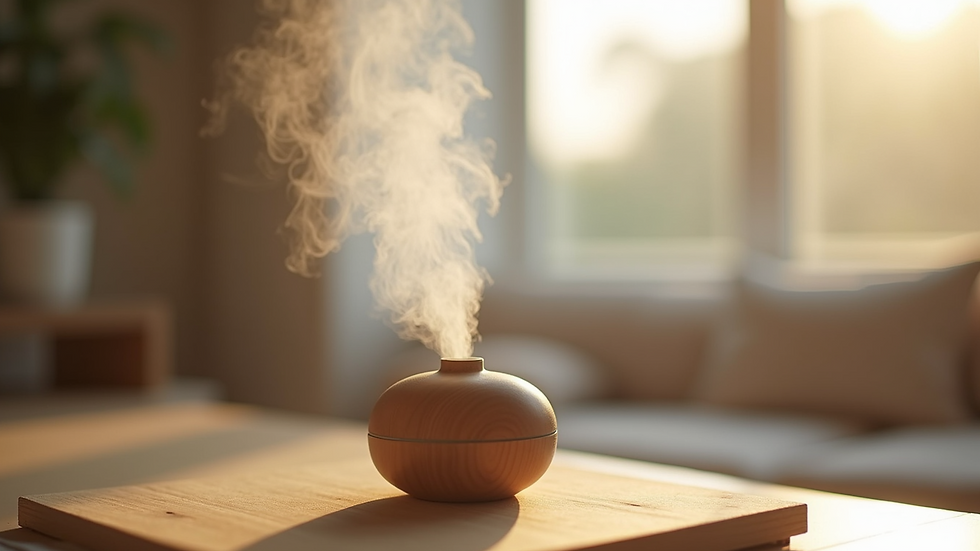The Science Behind Aromatherapy and Its Uses
- divinetouchpune33

- Sep 5, 2025
- 4 min read
Aromatherapy is a holistic healing treatment that uses natural plant extracts to promote health and well-being. It has been practiced for thousands of years, but only recently has science begun to uncover how and why it works. This article explores the scientific principles behind aromatherapy, its practical applications, and the benefits it offers.
Understanding Aromatherapy and How It Works
Aromatherapy involves the use of essential oils extracted from flowers, leaves, bark, and other parts of plants. These oils contain volatile compounds that can affect the body and mind when inhaled or applied to the skin.
When you inhale essential oils, the scent molecules travel through the nose to the olfactory bulb, a part of the brain linked to emotions and memory. This connection explains why certain smells can trigger emotional responses or memories. The olfactory bulb then sends signals to the limbic system, which controls mood, stress levels, and other physiological functions.
Topical application of essential oils allows the compounds to be absorbed through the skin and enter the bloodstream. This can lead to various effects, such as reducing inflammation or improving circulation.
The chemistry of essential oils is complex. They contain hundreds of different molecules, including terpenes, esters, aldehydes, and phenols. Each compound has unique properties that contribute to the overall effect of the oil.

Essential oils extracted from plants ready for aromatherapy use
The Role of Aromatherapy in Health and Wellness
Aromatherapy is widely used to support physical and mental health. It can be integrated into daily routines or used as part of professional treatments.
Some common uses include:
Stress relief: Lavender and chamomile oils are known for their calming effects. Inhaling these scents can reduce cortisol levels, the hormone associated with stress.
Improved sleep: Essential oils like lavender and sandalwood help promote relaxation and improve sleep quality.
Pain management: Peppermint and eucalyptus oils have analgesic properties that can help alleviate headaches, muscle pain, and joint discomfort.
Boosting immunity: Tea tree and eucalyptus oils have antimicrobial properties that may support the immune system.
Enhancing mood: Citrus oils such as orange and lemon can uplift mood and increase energy levels.
In addition to these, aromatherapy is often used in massage therapy, spa treatments, and even in clinical settings to complement conventional medicine.

A diffuser dispersing essential oils to create a calming atmosphere
What Problems Does Aromatherapy Solve?
Aromatherapy can address a variety of physical and emotional issues. Here are some specific problems it helps to solve:
Anxiety and Depression: Studies show that inhaling certain essential oils can reduce symptoms of anxiety and depression by influencing neurotransmitters like serotonin and dopamine.
Respiratory Issues: Oils such as eucalyptus and peppermint can clear nasal passages and ease breathing difficulties caused by colds or allergies.
Digestive Problems: Ginger and peppermint oils can relieve nausea, indigestion, and bloating.
Skin Conditions: Tea tree oil is effective against acne and fungal infections due to its antibacterial properties.
Headaches and Migraines: Applying diluted peppermint oil to the temples or inhaling lavender oil can reduce headache intensity.
While aromatherapy is not a cure-all, it offers a natural and gentle way to support health and manage symptoms.

Natural ingredients used to create essential oils for therapeutic purposes
How to Use Aromatherapy Safely and Effectively
To get the most from aromatherapy, it is important to use essential oils correctly and safely. Here are some practical tips:
Choose high-quality oils: Look for pure, therapeutic-grade essential oils without synthetic additives.
Dilute before applying: Essential oils are potent and should be diluted with carrier oils like coconut or jojoba oil before skin application.
Use a diffuser: Diffusers disperse oils into the air, allowing for safe inhalation over time.
Patch test: Before applying oils to large skin areas, do a patch test to check for allergic reactions.
Avoid ingestion: Do not consume essential oils unless under the guidance of a qualified professional.
Consult a healthcare provider: If you are pregnant, nursing, or have medical conditions, seek advice before using aromatherapy.
Incorporating aromatherapy into your daily routine can be as simple as adding a few drops of essential oil to your bath, using a diffuser in your living space, or applying diluted oils during massage.
For those interested in learning more about the aromatherapy benefits, there are many online courses and resources available to deepen your knowledge and skills.
Exploring the Future of Aromatherapy Research
Scientific research on aromatherapy is growing, with studies focusing on its mechanisms and potential therapeutic uses. Researchers are investigating how specific compounds in essential oils interact with the body at the molecular level.
Emerging areas of interest include:
Neurodegenerative diseases: Exploring whether aromatherapy can support cognitive function in conditions like Alzheimer's.
Cancer care: Studying how aromatherapy can help manage symptoms and improve quality of life for cancer patients.
Mental health: Developing aromatherapy protocols to complement treatments for anxiety, PTSD, and depression.
As evidence accumulates, aromatherapy may become more integrated into mainstream healthcare, offering a natural complement to conventional treatments.
Aromatherapy combines ancient wisdom with modern science to offer a versatile approach to health and wellness. By understanding its scientific basis and practical applications, you can harness the power of essential oils to enhance your physical and emotional well-being. Whether used for relaxation, symptom relief, or mood enhancement, aromatherapy provides a natural path to balance and harmony.




Comments